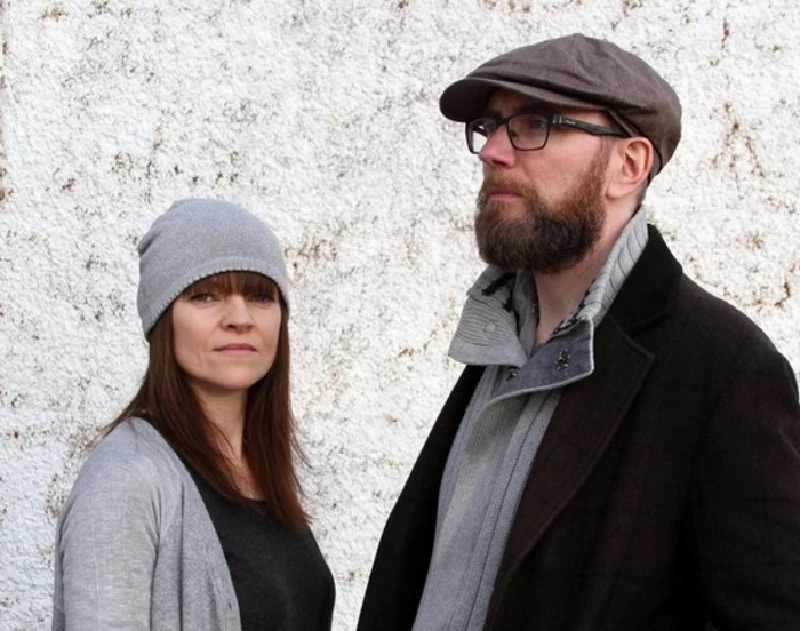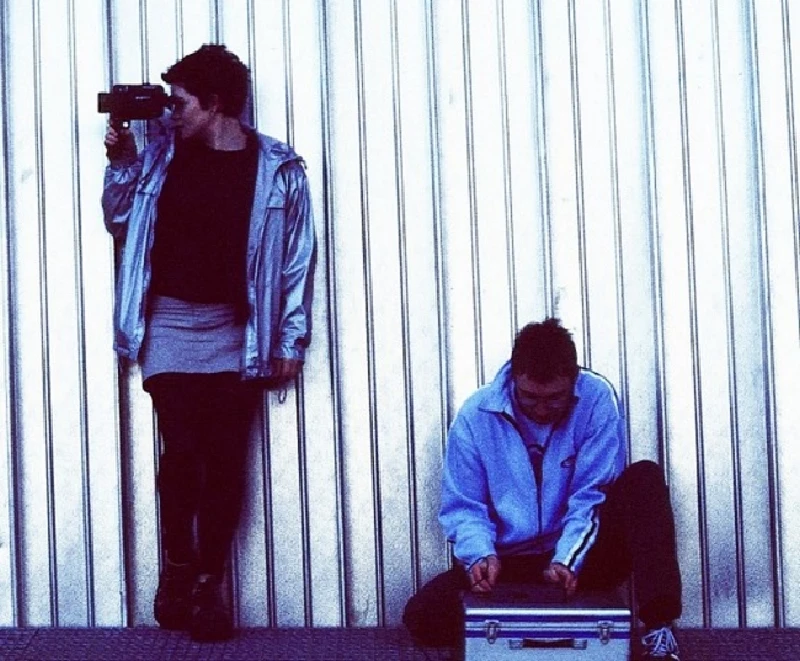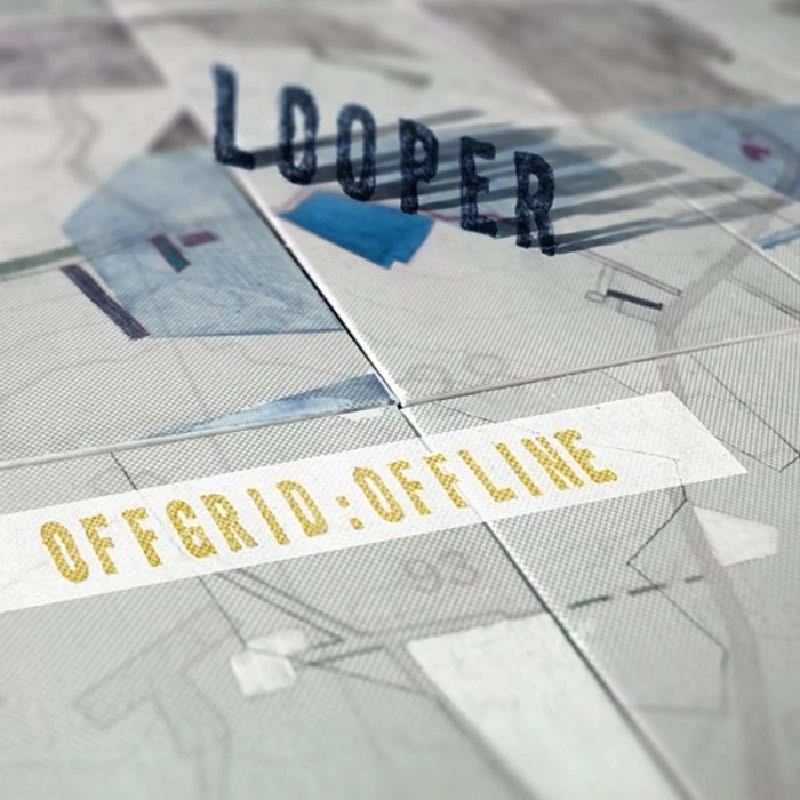Looper - Interview
by Erick Mertz
published: 21 / 5 / 2015

intro
Erick Mertz talks to Looper's Stuart David on the eve of the release of their five disc retrospective, 'Offgrid:Offline'
Writers throw the term “genre-defining” around more often than it is truly warranted. Such terms sound clever and intelligent. But really, how many bands or albums for that matter really define a whole swath of future music? Looper’s 1999 debut album ‘Up a Tree’ may be one of the rare cases of a single work emerging as an artistic landmark, carving a path for others to follow in. The scribes of the time called it “folk-hop”, a term that is more than clever. It’s downright accurate. Spot on, as they say. Folk-hop didn’t come around by accident, however; it was by way of a deliberate process of clear-eyed creative purpose and, as it turns out, the bold decision to leave behind a sure thing. Glaswegian twee rockers Belle and Sebastian had long established themselves on the indie-pop circuit, but erstwhile bassist Stuart David decided he needed to break out and do something else. He needed Looper. Sixteen long years have passed. Looper remains. The business of being an independent band has changed dramatically. Yet, David remains steadfast in his choice to branch out and do his own thing. I had a chance to talk to David as Mute Records prepares ‘These Things’, their five-disc look back at the band’s groundbreaking work. PB: More than twelve years have passed since ‘The Snare’, your last album came out. What’s been happening during that time? SD: For a few years after ‘The Snare’ we moved online and worked quite solidly releasing EPs there. Then Karn (David’s wife) went back to art school for four years, and during that time I concentrated more on literature, studying and writing novels. When Karn graduated we moved to the countryside and it took us a while to get set up there. Then we started working on our new album, ‘Offgrid:Offline’. PB: Writers often cite the time off taken between albums as a factor, but in your estimation, does the album format even matter anymore? SD: I think you can still make it matter. A lot of albums in the past had no real reason to be albums anyway, but something like ‘Ziggy Stardust’ or ‘Diamond Dogs’ only really work as albums. We quite often try to have recurring melodies and lyrical themes that mean if you listen to the work as an album you'll get an extra layer of meaning out of it that you don't get from the individual songs. PB: I have read that you were disenchanted with the label experience. What compelled you to go with looperama as your primary means of distribution? SD: The speed and the immediacy, as well as being able to communicate with listeners on a one-to-one basis. In the end, though, I found there was something missing in the process for me. A critical voice. And I also started to feel that I'd fallen for Silicon Valley's propaganda, and was simply providing free content to make the internet an established space. PB: When did you first conceive the idea of the newly released 5-disc set? How long did it take to pull together? Did you have criteria for deciding what went onto and what didn’t go onto the box set? SD: It was initially Mute's idea and we worked on it for four years, remastering everything and creating the artwork, and during that process we ourselves had the idea to reorder all the material and try and make sense of it. Essentially we put everything in with just a few omissions because of sample clearance, or some categories being too unwieldy. PB: I’ve been toying with the theory that we’re in a “post greatest hits collection” world right now. Would you agree? SD: When we started working on the box set there was also going to be a “best of” compact disc. At some point Mute decided to drop that, maybe because we are in a “post greatest hits collection” era. That was a disappointment to me and that was the point at which I decided to reorder the box set into what I saw as five “best of” compact discs. When I was growing up I always found new artists through their “best of” collections in the public library. If we are in a “post greatest hits collection” world I find that quite sad. PB: I listened to ‘Up a Tree’ until the grooves wore smooth. What happened there that could not as a member of Belle & Sebastian? SD: Singularity of vision. At the point we recorded ‘Up a Tree’, Belle and Sebastian was becoming much more of a collective making albums and decisions by committee. I don't think it would have been possible to make an album as focused and thematically coherent as ‘Up a Tree’ within Belle and Sebastian. PB: ‘Pitchfork’ referred to that record as the birth of “folk-hop”. So many years later, respond to that concept and the idea that you’ve created a sub-genre. SD: That's something we're very proud of. But we're still waiting for the genre to blossom and be properly crystallized by younger artists. PB: The feeling I get from Looper is that the band is something of a family affair. How did you manage to settle there? SD: Well, the only family members left in the band now are me and Karn. My brother Ronnie has decided he'd too old for music now, even though he's seven years younger than me. PB: With your connections to film so strong, has there ever been an impulse to adapt your novel ‘Nalda Said’? SD: The film rights have been optioned a few times and a few people have written screenplays of it but it's not something I could do myself. Film isn't a medium I have a great interest in. I prefer television. So, I don't think I would be able to do it justice. PB: Thank you.
Band Links:-
http://www.looperama.co.ukhttps://www.facebook.com/looperama
http://looperama.tumblr.com/
https://soundcloud.com/looperboy
https://twitter.com/looperama
http://en.wikipedia.org/wiki/Looper_%28band%29
Picture Gallery:-


profiles |
|
Profile (2015) |

|
| Erick Mertz examines 'These Things', a career-defining box set from legendary Glaswegian genre benders, Looper |
most viewed articles
current edition
Carl Ewens - David Bowie 1964 to 1982 On Track: Every Album, Every SongArmory Show - Interview with Richard Jobson
John McKay - Interview
Colin Blunstone - Thalia Hall, Chicago, 16/7/2025
Billie Eilish - O2 Arena, London, 10/7/2025
Bathers - Photoscapes 1
Visor Fest - Valencia, Spain, 26/9/2025...27/9/2025
Loft - Interview
Sir Tim Rice - Interview
Robert Forster - Interview
previous editions
Manic Street Preachers - (Gig of a Lifetime) Millennium Stadium, Cardiff, December 1999Heavenly - P.U.N.K. Girl EP
Beautiful South - Ten Songs That Made Me Love...
Oasis - Oasis, Earl's Court, London, 1995
Peter Perrett - In Dreams Begin Responsibilities Interview Part One
Boomtown Rats - Ten Songs That Made Me Love....
Coldplay - Wembley Arena. London, 16/8/2022
Prolapse - Interview
Pixies - Ten Songs That Made Me Love...
Trudie Myerscough-Harris - Interview
most viewed reviews
current edition
Davey Woodward - Mumbo in the JumboSick Man of Europe - The Sick Man of Europe
Lucy Spraggan - Other Sides of the Moon
Amy Macdonald - Is This What You've Been Waiting For?
Phew, Erika Kobayashi,, Dieter Moebius - Radium Girls
Bush - I Beat Loneliness
Suzanne Vega - Flying With Angels
Alice Cooper - The Revenge of Alice Cooper
Blueboy - 2
Cynthia Erivo - I Forgive You
Pennyblackmusic Regular Contributors
Adrian Janes
Amanda J. Window
Andrew Twambley
Anthony Dhanendran
Benjamin Howarth
Cila Warncke
Daniel Cressey
Darren Aston
Dastardly
Dave Goodwin
Denzil Watson
Dominic B. Simpson
Eoghan Lyng
Fiona Hutchings
Harry Sherriff
Helen Tipping
Jamie Rowland
John Clarkson
Julie Cruickshank
Kimberly Bright
Lisa Torem
Maarten Schiethart